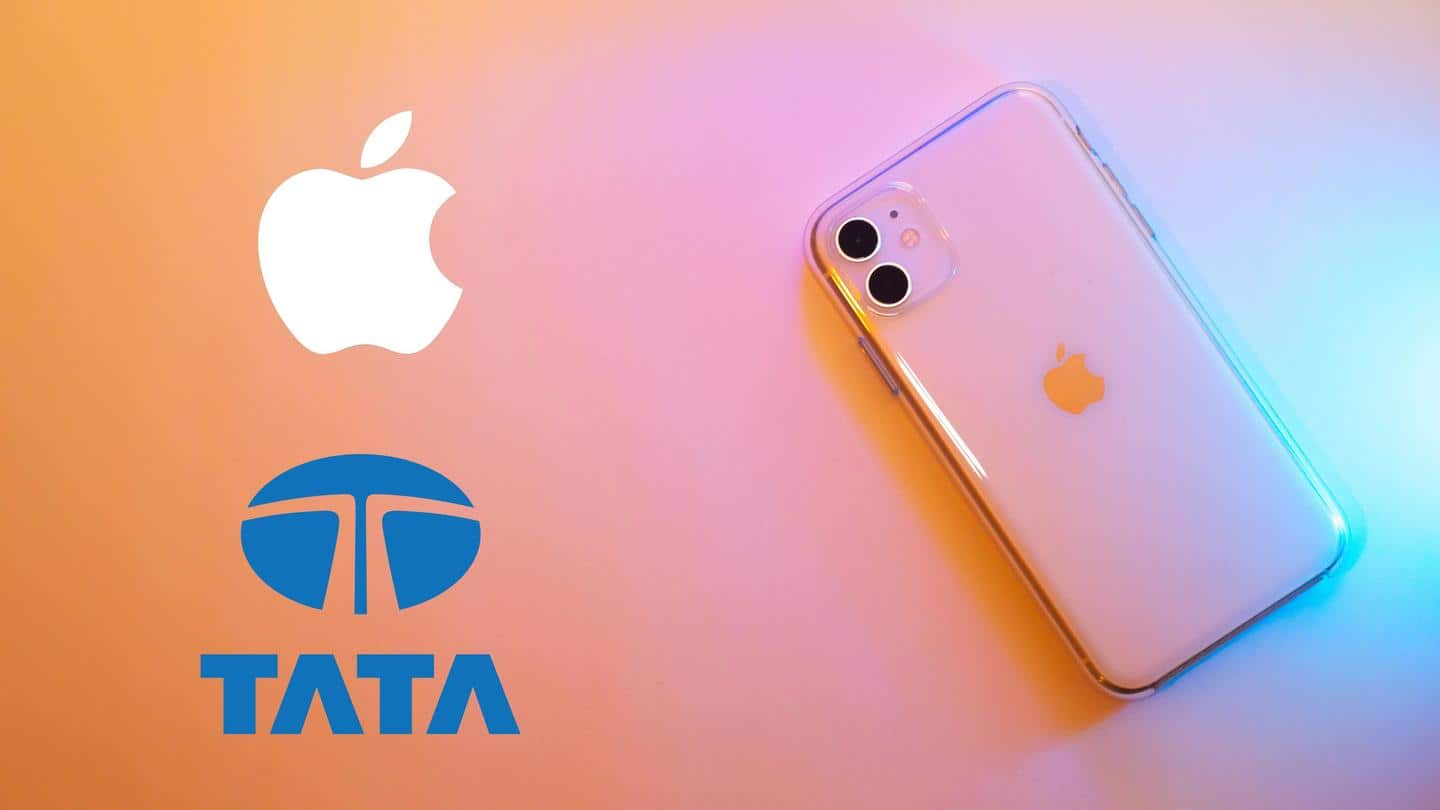Tata Group is in talks with Apple’s Taiwanese supplier for assembling iPhones

Tata Group is in talks with Apple’s Taiwanese supplier to assemble iPhones
The country’s efforts to compete with China would receive a huge boost from an Indian business producing iPhones. It could also convince other large electronics firms to think about doing their assembly in India.
Tata Group is in talks with a Taiwanese supplier to Apple Inc. about creating a joint venture for electronics manufacturing in India and producing iPhones there.
Those with intimate knowledge of the discussions claim that Tata aims to use Wistron Corp.’s strengths in product development, supply chain management, and assembly to become a major player in the technology manufacturing industry. The majority of iPhones are now assembled in China and India by Taiwanese manufacturing behemoths like Wistron and Foxconn Technology Group. If the collaboration is effective, Tata may build iPhones as the first Indian firm.
The nation’s aspirations to compete with China, whose supremacy in electronics manufacturing has been challenged by extensive Covid lockdowns and political issues with the US, would gain a significant boost from an Indian company making iPhones. It could also convince other major global electronics manufacturers to think about doing their assembly in India to lessen their dependency on China at a time when geopolitical dangers are rising.
The individuals, who must remain unnamed due to the sensitivity of the conversations, stated that the deal’s structure and other parameters, such as shareholdings, had not yet been finalized. One of the sources claims that the proposal may see Tata buy stock in Wistron’s Indian operation or the companies involved set up a new manufacturing plant. Both of those manoeuvres may be used, the insider suggested.
The negotiations, which came as the US tech giant looked to diversify production even further away from China and boost its supply chain in India, were not immediately known if Apple was aware of them.
Apple works with regional companies in the locations where it has production plants, as is widely known, assembling iPhones is a challenging process that requires adhering to the US company’s strict timelines and quality requirements.
Apple’s new iPhone will narrow the technology gap between China and India.
Wistron’s spokesperson declined to respond to questions. After being approached, Apple and Tata chose not to respond.
The new company would eventually aim to make up to five times as many iPhones as Wistron produces presently in India, according to one of the individuals. A portion of Wistron’s non-smartphone manufacturing business will likely be acquired by Mumbai-based Tata as a result of collaboration, the sources claim.
The leading conglomerate in India, Tata Group, with sales of roughly $128 billion, has said that electronics and high-tech manufacturing are two of its primary priority areas. Tata’s business is mostly focused on sectors like software, steel, and automobiles, but it has started producing iPhone chassis components in southern India as an early mover in the smartphone supply chain.

A deal with Tata would provide Wistron’s faltering Indian division with a strong local partner with substantial resources. A lot of the major digital companies around the globe are keen to develop in the automotive industry, which includes electric vehicles.
After years of attempts by Apple to expand its manufacturing capabilities in the nation, Wistron started producing iPhones there in 2017. At its factory in the state of Karnataka in southern India, the Taipei-based company currently assembles iPhones.
Other significant contract manufacturers for Apple, Foxconn and Pegatron Corp., have also been encouraged to invest in the country because of the potential of the 1.4 billion-person Indian consumer market and the financial incentives offered by Prime Minister Narendra Modi. Despite Apple’s strict sourcing requirements, India’s labour force and factories have not readily adopted Apple’s highly regulated methods: in two notable episodes, since iPhone assembly began there five years ago, workers protested over poor living conditions and pay.
In discussions with a Taiwanese manufacturer, Tata wants to produce iPhones in India
Beijing: To build a joint venture for the production of electronics in India to assemble iPhones there, the Tata group is in discussions with a Taiwanese supplier of Apple products.

People with knowledge of the situation claim that negotiations with Wistron Corp are aimed at making Tata a significant player in the technology manufacturing sector and that the Indian conglomerate wants to take advantage of the Taiwanese company’s expertise in product development, supply chain management, and assembly. The iPhone is now mostly put together in China and India by Taiwanese manufacturing behemoths like Wistron and Foxconn Technology Group. If the partnership is successful, Tata would be the first Indian business to produce an iPhone.
Indian efforts to compete with China, whose dominance in electronics manufacturing is threatened by the Covid shutdown and political tensions with the US, will benefit greatly from an Indian business making iPhones.
In a time when geopolitical dangers are increasing, this may convince other international electronics manufacturers to think about outsourcing production to India.
The persons, who requested anonymity due to concerns over their safety, said that discussions are in progress but that the deal’s structure and specifics, including the shareholding, have not yet been decided. One of the individuals said that the idea may entail either business constructing a new assembly factory or Tata purchasing stock in Wistron’s India operations. The source claims that they are also capable of doing both manoeuvres.
The negotiations, which came as the US tech giant tries to diversify its production away from China and boost its supply chain in India, were not immediately known if Apple was aware of them.
Although the US corporation is renowned for working with regional companies in regions where it establishes production facilities, assembling iPhones is a challenging process that necessitates meeting rigid timelines and quality requirements.
A spokesman from Wistron declined to comment. Tata and Apple did not respond to requests for comment. One of those involved said that the new business would eventually aspire to produce five times as many iPhones in India as Wistron now does. The transaction would result in Mumbai-based Tata acquiring not just handsets but also a stake in Wistron’s manufacturing firm, according to sources.
The largest conglomerate in India, Tata Group, with annual revenues of over $128 billion, has said that electronics and high-tech manufacturing are two of its primary priority areas.

Tata’s business is dominated by the software, steel, and automobile industries, but it has helped establish the smartphone supply chain by starting to make iPhone chassis components in southern India. A partnership with Tata would provide Wistron’s ailing Indian company with a capable local partner with substantial resources.
Tata has a presence in the automotive industry, notably electric cars, It is an industry that several of the biggest technological corporations worldwide are seeking to penetrate.

After years of attempts by Apple to improve production capacity in the country, Wistron began making iPhones in India in 2017. Currently, the Taipei-based business builds iPhones at its facility in the state of Karnataka in southern India.
Along with financial incentives for tech production, Prime Minister Narendra Modi’s assurance of India’s 1.4 billion consumers has encouraged Apple’s two main contract manufacturers, Foxconn and Pegatron Corp, to expand in the nation as well. However, India’s workforce and factories have had trouble implementing the strict standards that Apple demands of its suppliers. Since the iPhone assembly started in India five years ago, workers have discovered poor salaries and low wages in two prominent occurrences. have revolted because of unsatisfactory living and working conditions.
edited and proofread by nikita sharma




